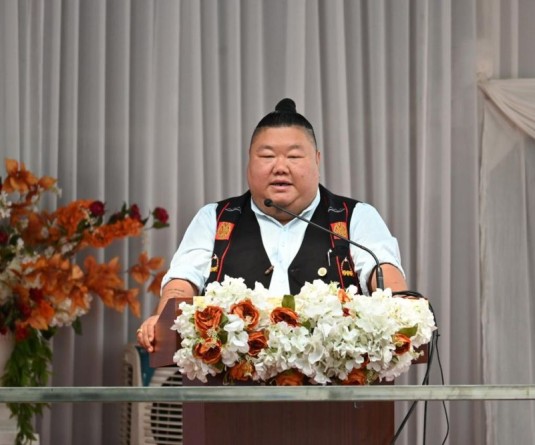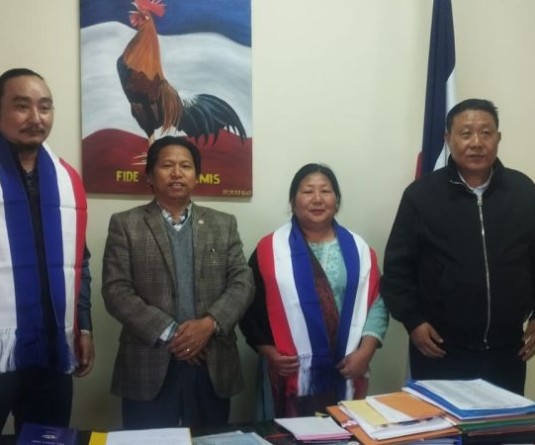Dr Moalemba Jamir, Associate Editor of The Morung Express, speaking at the panel discussion on ‘Media Ethics and Responsibility in a Changing Landscape’ held on September 13. Also seen are Esther Verma, Chief Operating Officer of Nagaland News Network; R Lungleng, host of The Lungleng Show and moderator Abokali Jimomi, writer and entrepreneur.
.jpg)
Transparency over sensationalism in a challenging digital landscape
Morung Express News
Dimapur | September 13
Journalism is often broadly pictured as a medium of information. Underneath this imagined drape lays an ethical framework based on which journalism, or the people in the profession, is obligated to function. The foundational principles, however, get either challenged or ignored, and allegedly more so with the advent of the internet, and the ‘democratisation’ of information.
The rapid shift has had the traditional pitted against the digital, often over the question of ethics, accountability, transparency and regulation. With this underlying dynamic in mind, The Morung Dialogue featured a panel discussion titled— ‘Media Ethics and Responsibility in a Changing Landscape’ on September 13. On the panel were Esther Verma, Chief Operating Officer of the Dimapur-based digital news channel Nagaland News Network (NNN); R Lungleng, host of The Lungleng Show; and Dr Moalemba Jamir, Associate Editor at The Morung Express.
The discussion was moderated by Abokali Jimomi, Writer and Entrepreneur, who set the tone by posing the question of balancing speed over accuracy, and maintaining independence despite the demands of the political or commercial kind. According to her, the challenge is not only “how information is presented, who is reporting and how news is reported, but how society learns to consume, question, and trust news responsibly.”
Dr Moalemba Jamir took an introspective approach, framing his argument on three sets of questions relating to transparency; treatment of subjects or one-sided framing, especially when it comes to identity or ethnicity; and journalistic practices and ethics.
By transparency, he implied disclosure of ownership and editorial leadership whether it is print, television or digital. “Before demanding ethics and ethical concerns from others, first the media has to practice it,” he said.
.webp)
On the second, he pointed out what he termed as “ambush journalism” where reporters play an invasive role. He criticised the increasing tendency to frame issues in a divisive “local versus outsider” narrative, which he held turns the media into a “participant in division” rather than an impartial witness.
Coming to the third, he emphasised making a distinction between a trained journalist and a “media practitioner.” While a journalist would lay emphasis on context, he argued that the latter would choose sensationalism over core ethics like accuracy and fairness.
Dr Jamir called for a clear separation of fact from opinion, a shared ethical standard across all platforms, and a return to the fundamentals of accuracy, accountability, and minimising harm—a principle he deemed vital for responsible journalism in a sensitive and close-knit society.
.webp)
R Lungleng identified context as the essential pillar of journalism, warning that without it, facts are easily misinterpreted. Lungleng urged practitioners to move beyond superficial reporting and become analytical voices that investigate the root causes of problems rather than just complaining about them.
He challenged the obsession with speed and sensationalism, stating that the media's goal should be to educate the public holistically, not to chase clicks. He believes journalism should act as an “interpreter of human suffering,” especially for minority communities.
He used the metaphor of a “moral compass without a needle”— a media that provides ethical guidance to society while remaining fiercely independent and unswayed by propaganda or external pressures. He termed journalism as a sacred platform, where the responsibility to deliver deep, well-researched truth is paramount.
Esther Verma focused on the practical challenges and responsibilities of running a digital media platform. She asserted the need for strong internal ethics, verification, and a clear understanding of the media’s role in a digital landscape.
.webp)
Highlighting how easily rumors spread with a single click, she termed the process of verifying every piece of information as non-negotiable.
She said that reporters hold a great responsibility and “cannot entice hatred, violence, and chaos.” She advocated for greater media literacy so citizens can help identify fake news, and differentiating between credible news organisations and “mere YouTubers.”
She also asserted the news media's independence as the “fourth pillar,” questioning the role of government regulation and its potential to compromise private media.





